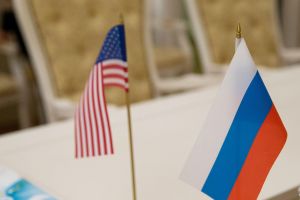Findings from a new US-Russia binational survey, conducted by the Chicago Council on Global Affairs and the Levada Analytical Center, reveal that publics in both countries have noticed cracks in the US-EU relationship.
Key Findings
Building over the last few years, disputes between the United States and Europe over trade, climate change, and nuclear weapons were on full display at the annual Munich Security Conference last month. Russian leaders have tried to exploit these strains between the United States and its allies. In Munich, Foreign Minister Sergey Lavrov of Russia suggested that the European Union and Russia build a "shared European home." 1 Sidelining the United States through deepened ties with Europe has long been a strategy of the Kremlin to weaken the West’s united front against Russia’s regional and international aggression. 2
Findings from a new US-Russia binational survey, conducted by the Chicago Council on Global Affairs and the Levada Analytical Center, reveal that publics in both countries have noticed cracks in the US-EU relationship. 3 While Americans have long expressed support for NATO, a majority say that unity among NATO allies is weakening. At the same time, Russians’ impressions that transatlantic security links are weakening contribute to their sense that the United States is now in a weaker global position.
- 1"Foreign Minister Sergey Lavrov's remarks and answers to media questions at the Munich Security Conference, Munich, February 16, 2019," The Ministry of Foreign Affairs of the Russian Federation
- 2Dina Smeltz, Lily Wojtowicz, Denis Volkov, and Stepan Goncharov, "US-Russia Experts Paint a Dim Picture of Bilateral Relations Before Summit,” July 2018
- 3This brief is based on coordinated surveys conducted by Dina Smeltz and Lily Wojtowicz of the Chicago Council on Global Affairs and Denis Volkov and Stepan Goncharov of the Levada Analytical Center in Moscow. The joint project on US-Russian public opinion about foreign policy issues was generously funded by the Carnegie Corporation.




